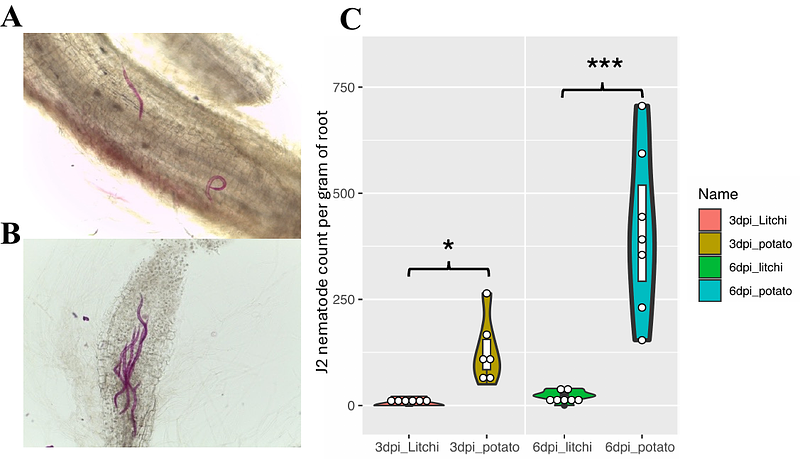Appraising the natural root-knot nematode resistance inSolanum sisymbriifolium, a wild relative of potato

Appraising the natural root-knot nematode resistance inSolanum sisymbriifolium, a wild relative of potato
Ko, I.; Caplan, A. B.; Kuhl, J. C.; Gleason, C.
AbstractRoot-knot nematodes (RKNs) are a major pest of Solanum and other economically important crops worldwide. Two species of RKNs (Meloidogyne chitwoodi and Meloidogyne hapla) are persistent threats to potato growers of the United States. These RKNs infect potato roots and tubers, causing tuber blemishes that decrease potato market value and significantly impact the profitability of the infected potato crop. Due to environmental, health, and economic concerns, the longstanding control methods of using soil fumigants and post-plant nematicides are not favored by producers and consumers. Therefore, deploying RKN resistant cultivars is an alternative method to control RKN damage. However, there is no genetic resistance to RKN in commercially-available, cultivated potatoes. Therefore, the critical first step to breed a RKN resistant plant is to identify a genetic source of RKN resistance. A wild Solanum species, Solanum sisymbriifolium, also known as litchi tomato, can effectively control several agronomically important species of plant parasitic nematodes. Solanum sisymbriifolium is completely resistant to RKNs; only a few nematodes enter the plant roots and those that do, cannot establish a feeding site. To understand its ability to prevent RKNs from forming feeding sites, we performed transcriptomic analysis of S. sisymbriifolium roots inoculated with the Northern root knot nematode, M. hapla. Combined with the annotation of the recently published S. sisymbriifolium genome assembly, we discovered 13 differentially expressed resistance-related genes upon nematode inoculation. By transforming potatoes with candidate resistance genes from S. sisymbriifolium, we aim to understand the strong genetic resistance in S. sisymbriifolium and whether those genes are necessary and sufficient to drive resistance to RKN in potatoes. This information will help us understand gene functions and help us generate RKN resistance in relevant Solanum crops.